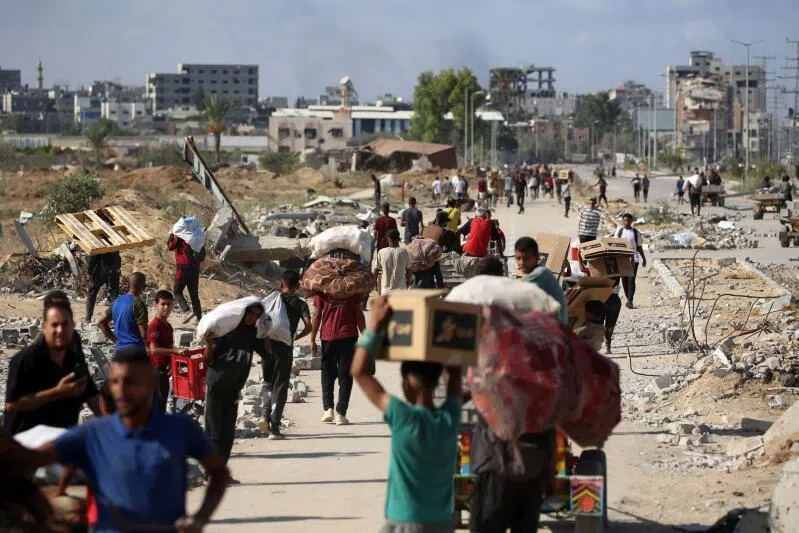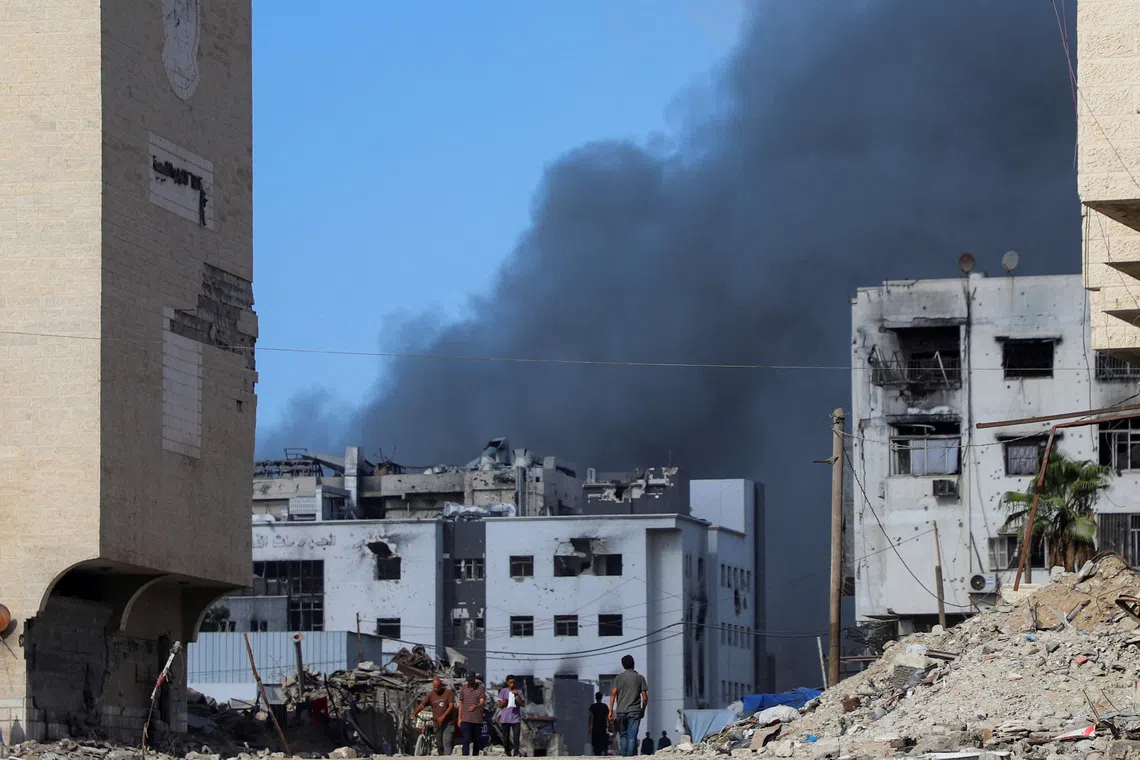Negotiators gather for Gaza talks, but mediators caution deal may not be swift
Sign up now: Get ST's newsletters delivered to your inbox

The US' plan is the most advanced effort yet to halt the war, the longest and most destructive ever in generations of conflict between Israel and the Palestinians.
PHOTO: AFP
SHARM EL-SHEIKH, Egypt – Officials from Israel and Hamas were in an Egyptian resort on Oct 6 to launch talks that the US hopes will bring a halt to the war in Gaza and the release of hostages, despite contentious issues like a disarmament of the Palestinian militant group.
The negotiations on US President Donald Trump’s plan were set to begin on the eve of the second anniversary of the Hamas attack on Israel that triggered the war, when fighters killed 1,200 people and took 251 hostages, the deadliest day for Jews since the Holocaust.
Israel’s retaliatory military campaign has killed more than 67,000 Palestinians and left the majority of 2.2 million Gazans homeless and hungry in the rubble of the enclave destroyed by relentless bombardment.
Two Israeli sources said the Israeli negotiators had arrived in Egypt’s Red Sea resort of Sharm el-Sheikh for the talks, focused on freeing the hostages, part of Mr Trump’s 20-point blueprint for ending the two-year-old conflict. Hamas officials had already arrived earlier in the day.
Wariness
“If there is a deal, then we survive. If there isn’t, it is like we have been sentenced to death,” said Ms Gharam Mohammad, 20, displaced along with her family in central Gaza.
An official briefed on the negotiations, speaking on condition of anonymity, said he expected the round of talks kicking off on Oct 6 would not be quick, lasting at least a few days.
Prompt agreement is unlikely as the goal is to clinch a comprehensive deal with all details worked out before the ceasefire can begin to be implemented, the official said.
A Palestinian official close to the talks was sceptical about prospects of a breakthrough given deep mutual mistrust, saying Hamas and other Palestinian factions were worried that Israel – led by the most far-right government in its history – might ditch negotiations once it recovered the hostages.
The Israeli delegation includes officials from spy agencies Mossad and Shin Bet, Prime Minister Benjamin Netanyahu’s foreign policy adviser Ophir Falk, and hostages coordinator Gal Hirsch.
However, Israel’s chief negotiator, Strategic Affairs Minister Ron Dermer, was expected to join only later this week, pending developments in the negotiations, according to three Israeli officials. Spokespersons for Mr Dermer and the Prime Minister did not immediately comment.
The Hamas delegation is led by the group’s exiled Gaza chief Khalil al-Hayya, whose visit to Egypt was the first since he survived an Israeli air strike
Negotiators from Hamas will seek clarity on a mechanism to achieve a swop of the remaining hostages – both alive and dead – for Palestinian prisoners held in Israel, as well as an Israeli military withdrawal from Gaza and a ceasefire, according to a statement put out by the Islamist group late on Oct 5.
A thorny issue is likely to be the Israeli demand, echoed in Mr Trump’s plan, that Hamas disarm, a Hamas source told Reuters. The group has insisted it will not disarm unless Israel ends its occupation and a Palestinian state is created.
Mr Netanyahu, whose country has become internationally isolated over its devastation of Gaza, says a Palestinian state will never transpire. Britain, France and several other Western countries recognised Palestinian independence in September.
Israel intercepted a flotilla attempting to bring aid to Gaza over the weekend. On Oct 6, it deported scores of detained activists from the flotilla, including the most prominent, Swedish climate campaigner Greta Thunberg.
Fundamentals agreed
Hamas and Israel have agreed to the fundamentals of Mr Trump’s plan, though not key details. The US President has been optimistic after winning backing from Arab and Western states.
“I am told that the first phase should be completed this week, and I am asking everyone to move fast,” he said in a social media post.
Mr Trump’s plan
Israel has eased up on its attacks on Gaza in the past 24 hours that preceded the Gaza talks, with the enclave’s Health Ministry reporting a retreat in the relentless daily death toll.

Smoke rising in Gaza City after an Israeli strike on Oct 5.
PHOTO: REUTERS
German Foreign Minister Johann Wadephul said the talks were more promising than previous iterations as “for the first time in two years, it is not just about a ceasefire, but about a viable political solution”.
Mr Trump, who brokered normalisation deals with Israel and several Arab states during his first term in 2020, has said his Gaza plan could usher in a wider peace across the Middle East and transform the region.
The first phase of the talks deals with the release of hostages in exchange for Palestinians jailed in Israel. There are 48 remaining hostages in Gaza, 20 of whom are believed to be alive.
Hamas on Oct 3 approved a hostage release and some other elements
Domestically, Mr Netanyahu is caught between growing pressure to end the war – from hostage families and a war-weary public – and demands from ultra-nationalist members of his coalition who insist there must be no let-up in efforts to annihilate Hamas. REUTERS


